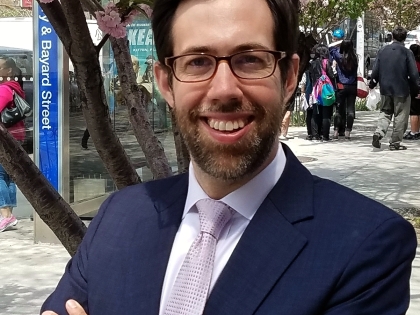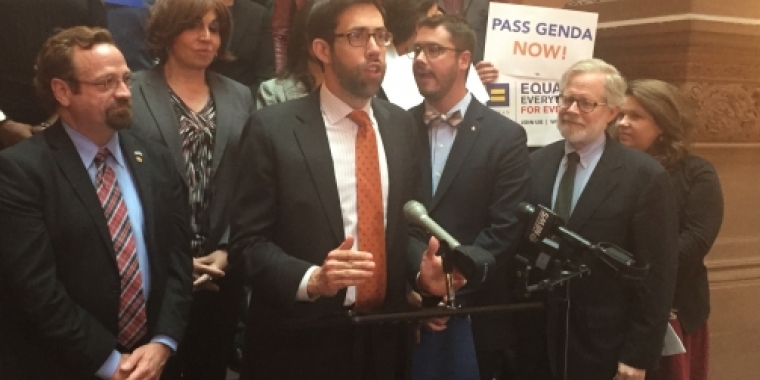
Squadron & Hoylman Public Comments on Cuomo Administration's New Regulations Clarifying Transgender Anti-Discrimination Protections
December 22, 2015

NEW YORK – Yesterday, State Senators Daniel Squadron (D-Manhattan/Brooklyn) and Brad Hoylman (D-Manhattan) submitted public comments to the New York State Division of Human Rights (DHR) strongly supporting proposed regulations, announced earlier this year by Governor Cuomo, which clarify legal protections against discrimination in housing, employment, and public accommodations for transgender and gender-nonconforming individuals.
In their comments, Senators Squadron and Hoylman note that while “it has been the shame of our state that for so long transgender individuals have been vulnerable to widespread discrimination,” the new regulations by DHR bring “New York closer to a day when all our citizens can enjoy the full equality, and basic protections, that our laws require." Senator Squadron is the prime Senate sponsor of the Gender Expression Non-Discrimination Act and Senator Hoylman is a co-sponsor.
Please see the full comments below and attached:
###
THE SENATE
STATE OF NEW YORK
PUBLIC COMMENT OF STATE SENATORS DANIEL SQUADRON AND BRAD HOYLMAN ON PROPOSED RULE RELATING TO GENDER IDENTITY DISCRIMINATION
December 21, 2015
Our names are Daniel Squadron and Brad Hoylman, and we represent, respectively, the 26th and 27th Districts in the New York State Senate. The 26th District includes the Manhattan neighborhoods of Tribeca, Battery Park City, the Lower East Side, Chinatown, the Financial District, Greenwich Village, Little Italy, SoHo and the East Village and the Brooklyn neighborhoods of Greenpoint, Williamsburg, Vinegar Hill, DUMBO, Fulton Ferry, Brooklyn Heights, Cobble Hill, and Carroll Gardens. The 27th District includes Greenwich Village, Chelsea, Clinton/Hell’s Kitchen, Upper West Side, Times Square, Columbus Circle, Midtown/East Midtown, part of the Lower East Side, and the East Village. Senator Squadron is the sponsor of the Gender Expression Non-Discrimination Act (“GENDA”) (S.195/A.4226) and Senator Hoylman is the only openly-LGBT member of the State Senate.
We commend the New York State Division of Human Rights (“the Division”) for promulgating this rule, which will clarify the legal protections that the Human Rights Law offers to transgender New Yorkers. We want to thank Governor Cuomo for his leadership on this issue and acknowledge our legislative colleagues who have joined us to push for passage of GENDA. Most importantly, we wish to recognize the advocates and members of the community whose tireless advocacy led to this step forward.
New York was the first state in the country to enact a Human Rights Law, with the passage of the Ives-Quinn Anti-Discrimination Bill in 1945 (renamed the Human Rights Law in 1968). This law prohibited discrimination in employment based on race, creed, color and national origin. Since that time, the law has been expanded to include more protected classes. Other additions to the Human Rights Law since its initial passage include age, military status, sex, marital status and disability. These protections now extend beyond employment to areas such as housing and access to public accommodations. The proposed rule draws its statutory authority from this law.
The Division of Human Rights’ powers and duties under the Executive Law, clarified by an extensive body of case law, ensure that the proposed rule is enforceable, appropriate and valid. Section 295(5) of the Executive Law grants the State Division of Human Rights the power to “adopt, promulgate, amend and rescind suitable rules and regulations to carry out the provisions” of the state’s Human Rights Law. The Division not only enforces the law, it is also empowered to promulgate regulations interpreting it. The proposed rule clarifies that the term “sex,” as used in the Human Rights Law, includes gender identity, gender expression and the status of being transgender, as defined in the rule. Therefore, the prohibitions and protections contained in the Human Rights Law against discrimination on the basis of sex apply to people who are discriminated against on the basis of gender identity, gender expression, or transgender status. This proposed rule simply clarifies what has been validated by New York State and federal case law.
As discussed in the proposed rule’s “Regulatory Impact Statement,” courts have supported protections for transgender New Yorkers based on sex under the Human Rights Law. In Richards v. U.S. Tennis Association, “it was recognized that sex discrimination claims under the Human Rights Law may be brought by individuals alleging discrimination because of their gender identity.” Subsequent cases sided with plaintiffs who had been discriminated against in areas such as housing and employment. When presented with cases involving transgender and gender nonconforming New Yorkers, courts have reviewed the facts and interpreted that state law protections against discrimination based on sex extend to transgender and gender nonconforming people. The proposed regulations “clarify the impact of these legal developments on enforcement of the sex discrimination prohibitions.”In addition, the rule also speaks to “gender dysphoria.” As part of this rule, it is protected under the Human Rights Law.
It has been the shame of our state that for so long transgender individuals have been vulnerable to widespread discrimination, including in housing, employment and public accommodations, simply for being who they are. Meanwhile, in other states, statutory protections have been extended to transgender residents while the New York State Legislature has failed to act (GENDA has passed the Assembly eight times but has been blocked repeatedly from receiving a vote in the Senate). Such laws, which explicitly name gender identity and expression as protected categories, raise the profile of transgender and gender nonconforming victims of discrimination and offer crystal clear notice to anyone reading them that such discrimination is unlawful. In 1993, Minnesota became the first state to explicitly name gender identity as a protected category. It took another eight years for Rhode Island to become the second state to do so. Today, a total of eighteen states, the District of Columbia and Puerto Rico have passed laws prohibiting discrimination against transgender people.
Similarly, New York State’s localities have increasingly added explicit civil rights protections for transgender and gender nonconforming people to their laws. The cities of Albany, Binghamton, Buffalo, Ithaca, New York City, Rochester, Syracuse, and Troy have enacted local laws explicitly confirming that transgender and gender nonconforming residents are protected, as have Albany, Suffolk, Tompkins and Westchester counties. But these protections lack the consistency and impact of a statewide rule. And the consequences are real.
The personal costs of transgender discrimination can be profound. According to the Empire State Pride Agenda, 75 percent of transgender New Yorkers have experienced harassment on the job, 20 percent have lost their job, 19 percent have been denied a home or apartment, and 18 percent have been homeless, simply due to their gender identity or expression.This is deeply unacceptable.
There are statewide economic costs to this discrimination, as well. A 2013 study by the Williams Institute estimated that employment discrimination against transgender workers costs the State of New York more than $1 million a year in Medicaid expenditures, while housing discrimination contributes anywhere from $475,000 to $5.9 million annually in federal and state housing program expenditures.
Discrimination robs people of their dignity and the prospects of a successful and fulfilled life, so it is urgent that New York provide transgender people clear confirmation that they can access the protections and remedies included in the Human Rights Law. The remedy is straightforward. Those who feel that they have been aggrieved by an unlawful discriminatory practice will be able file a complaint with the Division of Human Rights, which is required by law to promptly investigate the complaint and determine whether there is probable cause to believe discrimination took place. Should the case go to a public hearing, the Commissioner of Human Rights will ultimately decide whether an unlawful discriminatory practice took place. As with any case where a New Yorker is unlawfully discriminated against, the Commissioner may award the “job, housing or other benefits, back and front pay, compensatory damages, [and] civil fines and penalties […] up to $50,000 or up to $100,000 if the discrimination is found to be willful, wanton, or malicious.”
Seventy years ago, New York State recognized that discrimination against a person simply for who they were was wrong, and led the nation by creating a Human Rights Law. We will continue to push for GENDA’s passage in order to send that same message today. As we continue that campaign, this rule brings New York closer to a day when all our citizens can enjoy the full equality, and basic protections, that our laws require.
We would like to thank the New York State Division of Human Rights for the opportunity to submit this public comment. As the Senate sponsors of GENDA, we have long supported equal protections for transgender New Yorkers and we look forward to the proposed rule’s full implementation.
related legislation
Share this Article or Press Release
Newsroom
Go to NewsroomGENDA Sponsor Squadron On The Governor's Executive Action
October 22, 2015


Senator Squadron's Senior Resource Guide
October 16, 2015
